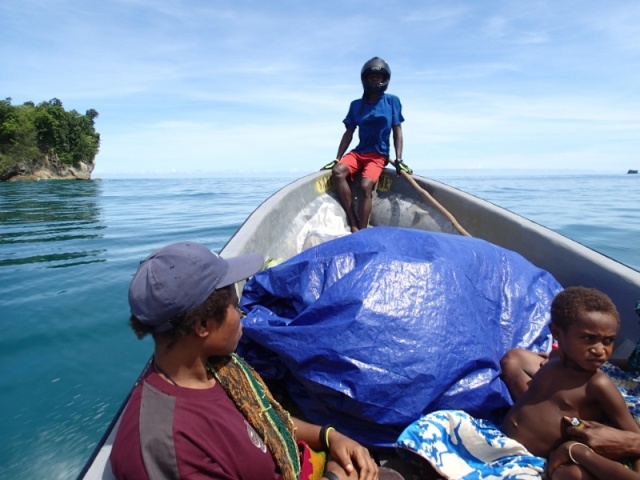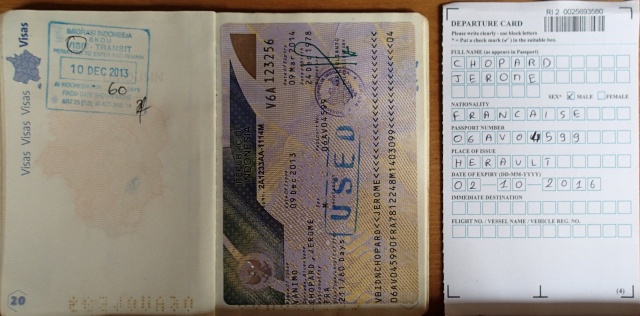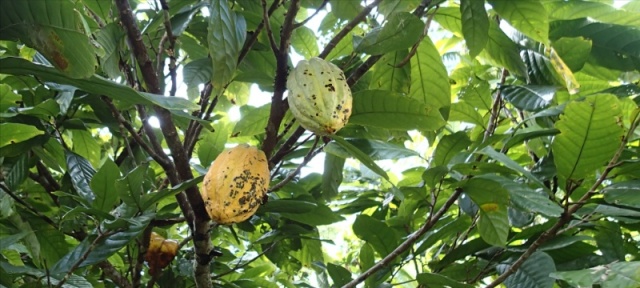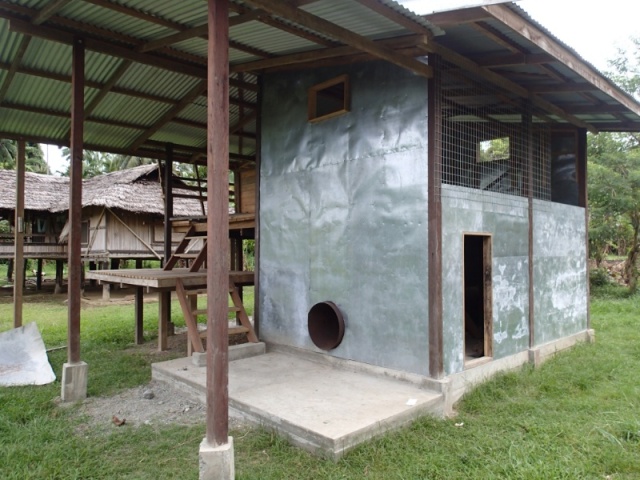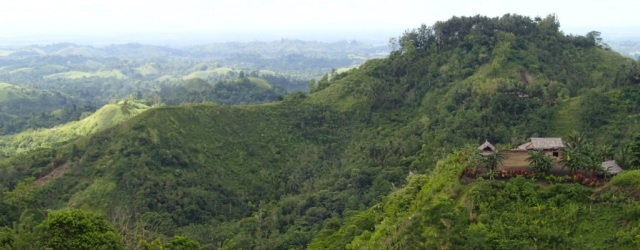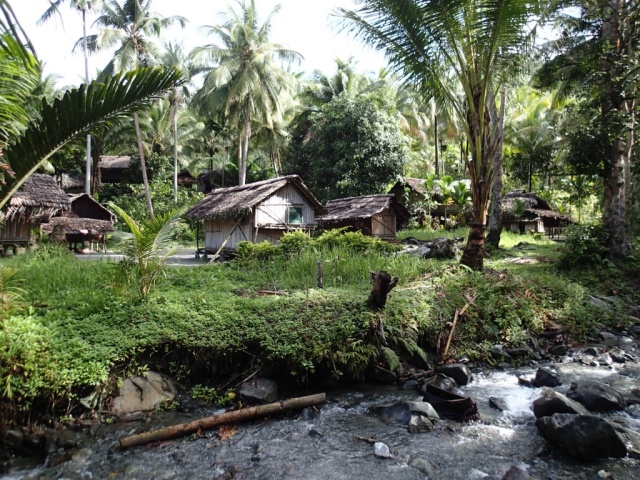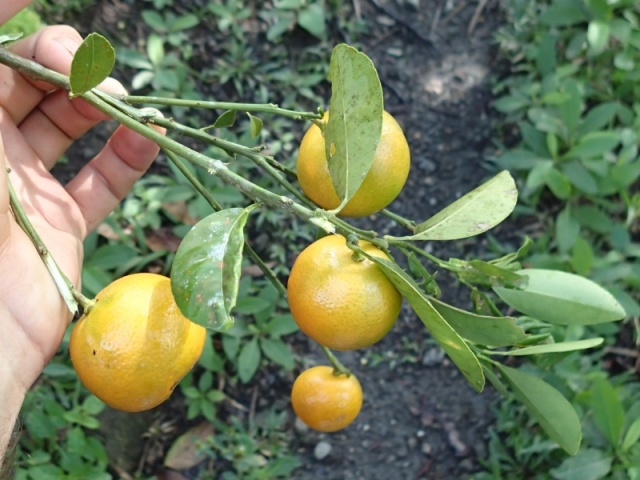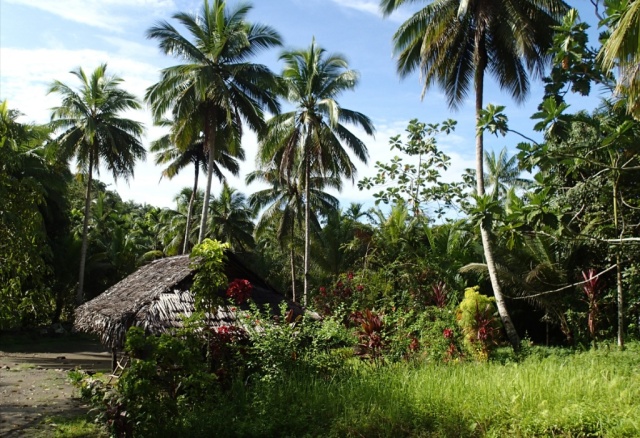Cette fois c’est la bonne. Nous n’avons toujours pas de nouvelles de Patrick mais nous nous levons quand même à une heure du matin pour marcher jusqu’à la route principale. Il fait encore nuit noire quand nous arrivons une heure plus tard à côté d’un carrefour, arrêt officiel, bien que non signalé, du pmv. Un couple est assis et l’attend sur le bord de la route mais la pluie nous surprend et nous nous refugions dans un hangar en construction. J’essais de gagner quelques heures de sommeil allongé la tête sur mon sac. Le bus arrive enfin vers cinq heures et nous dépose au petit matin sur la plage de Wewak.
La première partie du trajet pour rejoindre la frontière demande de rejoindre Aitape par la route. Il n’y a pas de transports en commun mais des particuliers font suffisamment la route en semaine pour pouvoir trouver une place à l’arrière d’un véhicule. Nous sommes dimanche et j’attends depuis deux heures sans succès. L’attente n’améliore pas mon humeur, je suis en colère contre Patrick. Lorsque nous avons dormi chez sa famille il y a trois jours j’ai certainement oublié mon couteau dans la chambre. J’ai passé les deux derniers jours à lui demander d’appeler ses parents pour pouvoir le récupérer. Comportement typique de mâle, au lieu de me m’expliquer qu’il n’a plus de batterie ou plus de forfait, ce en quoi j’aurais pu l’aider, il a préféré m’affirmer qu’il allait bientôt le faire. Résultat je suis à Wewak, en passe de quitter le pays pour toujours et plus moyen de le joindre lui ou ses parents. Je peux faire une croix sur mon couteau.
Fidelis (musique de gladiator en fond, c’est du moins comme ça que je me suis souvenu de son prénom) cherche lui aussi à rejoindre Vanimo. Il a un plan et comme la famille le connait, ils me laissent entre ses mains. Une heure plus tard son ami, négociant en cacao, arrive et je monte dans la benne avec les jeunes, en route pour Aitape. La route est bonne même si elle emprunte parfois le lit des fleuves. John conduit vite, certainement trop vite pour l’état de la route mais je profite de l’absence de législation du pays pour faire une partie du trajet debout dans la benne les deux mains sur la cabine la calvitie au vent. Nous arrivons chez sa soeur qui devrait nous accueillir pour la nuit.


Surprise, dans le jardin un immense manguier dont les fruits sont mûrs. Les enfants, en marchant sur des branches qui auraient cassé dix fois sous mon poids, m’en cueillent un plein sac. A six heures du soir, la soeur n’est toujours pas revenue des îles et John, qui a fait les trois heures de trajet depuis Wewak uniquement pour la rencontrer, doit partir. J’attends donc son arrivée avec Fidelis en mangeant les mangues, en buvant un café tellement sucré qu’on dirait de la glace fondue et en mangeant des biscuits saveur boeuf ou tomate.
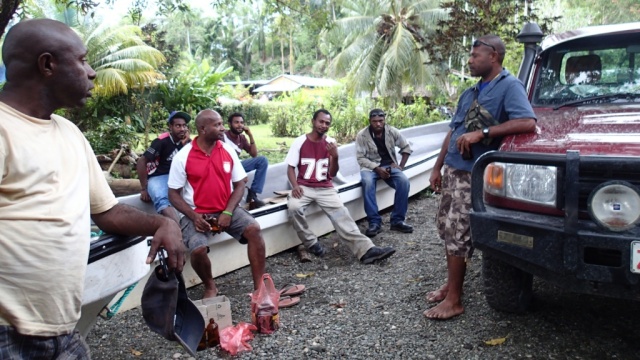
Le plan a changé. La femme de Fidelis, qui travaille pour le gouvernement, doit arriver avec deux voitures pour se rendre à Vanimo pour une mission officielle. Ils arrivent au moment du dîner et nous quittons la famille vers dix heures du soir après avoir partagé une assiette de riz. Le trajet Aitape Vanimo se fait d’ordinaire en bateau, la route étant en trop mauvais état. Nous traversons effectivement plusieurs rivières avec de l’eau jusqu’aux portières mais les Toyota passent. A minuit nous rencontrons la boue. Les voitures patinent. Notre chauffeur découvre visiblement la conduite tout terrain et dois se faire expliquer le fonctionnement du réducteur de vitesse. J’espère que cela va aider à une conduite plus en douceur. Jusqu’à présent sa technique de franchisement consiste simplement à appuyer plus fort sur l’accélérateur quelle que soit la difficulté: passage de trou d’eau avec bas de caisse qui touche sous l’écrasement des amortisseurs, patinage dans la boue. La nuit avance mais nous sommes à l’arrêt. Après une heure de franchissements divers, nous sommes enfin bloqué par suffisamment de boue pour ne plus pouvoir aller de l’avant. La voiture de tête ne peux d’ailleurs plus revenir non plus. Aucun équipement de franchissement dans les voitures et une vague corde polypropylène pour tracter. Elle casse au premier essai et notre conducteur s’embourbe au second. A 2:22 la décision est enfin prise de faire demi-tour et de rejoindre Aitape. Je suis curieux de voir comment nous allons pouvoir refranchir certaines difficultés. Nous restons effectivement bloqués encore un bon moment dans la boue mais nous finissons par passer à 3:33. Vers cinq heures nous sommes de retour à Aitape et je me couche à l’arrière de la voiture en attendant l’aube.
Au matin toute l’equipe se dirige vers les bateaux pour embarquer. Après discussion au téléphone avec leur chef, seules deux personnes continuent sur Vanimo. Les autres rentrent avec les voitures sur Wewak.
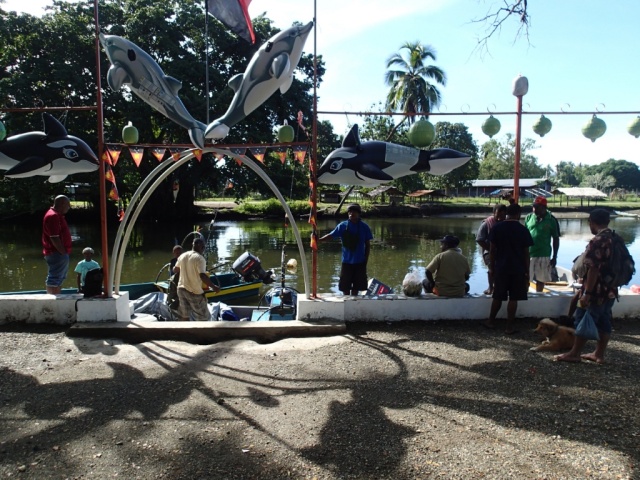
Après un premier départ manqué, le pilote a cassé une bougie en les serrant mais ne s’en rend compte qu’en pleine mer, nous voguons enfin vers Vanimo. Trois heures plus tard nous abordons dans la ville et pas moyen de joindre mon contact. Je m’en remets à Fidelis qui nous conduit chez un ami. Au cours des dernières 48 heures je n’en ai dormi épisodiquement que cinq. Je suis claqué et brûlé en partie par le soleil: sieste et papaye.
